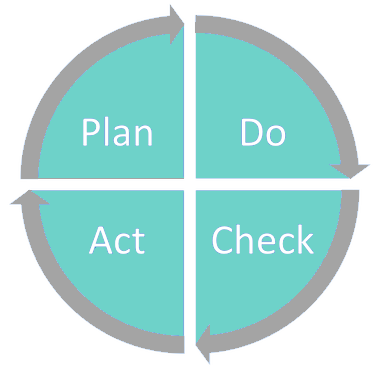If anything needs to be done at Dr Greenwood’s, you can be sure Sarah is the person to get it done. Sarah has been Dr Greenwood’s secretary for eight years – and in the past two years has been promoted to the role of Practice Manager. Her days are extremely busy managing the staff, appointment book and day-to-day issues. The banking is reconciled efficiently and treatment rooms are clean, equipment sterilised and well stocked. Yet with all this efficiency in his practice, Dr Greenwood still has no idea how well his practice doing. His Practice Manager is working hard ‘in’ the business, yet there is no one working ‘on’ the business.
The role of the Practice Manager has been a very important one within the medical practice. The medical practitioner has limited time – and needs an effective manager to develop an effective business plan and ensure it is implemented. As times become more competitive and practices more expensive to run, an effective management process is imperative. Medical practitioners have short careers – and therefore there is little margin for error.
As a medical business advisor since 2001, I have been working with medical businesses in a private setting to plan and implement effective growth strategies. When reviewing existing business organisational structures, I often find the expectations placed on a Practice Manager are simply unrealistic. This could be due to limited time for the Practice Manager to work on the everyday needs of the practice, then find time to implement the strategic plan. Or it may be that the Practice Manager’s strengths lie in the day-to-day operations, and they simply do not have an understanding of the importance of planning and implementing growth strategies.
The clients with whom I have had the most success are those who have identified this pattern and with whom I work to restructure the organisation. We introduce the role of a Business Manager for ‘business development’ planning and implementation. This role can be filled from suitable Practice Managers who can step up to the role or we recruit a suitable candidate. Daily operations are then given to the new role of Team Leader or Office Manager. This gives you the opportunity either to recruit from within or advertise externally.
We find many of our clients engage our services to coach and mentor the current Practice Manager, who is generally very good in managing the day-to-day operations of the practice, but requires coaching and mentoring in strategic business development and implementation.
Do I have a Practice Manager or an Office Manager?
Once the need for an effective Practice Manager or Business Manager is identified, I am then most often asked whether the current Practice Manager fits the role the practice needs. The best way to establish this is to review whether the Practice Manager is doing the following tasks. If not, then I would suggest your Practice Manager is really an Office Manager:
Practice analysis:
- Review current practice
- Make recommendations for improvement
- Business planning and implementation
Project management:
- Strategic business development
- Implementation of projects
- Development of business management schedule
Change Management Facilitation:
- Facilitating changes in direction of business
Staff:
- Education, mentoring and monitoring
- Assistance in recruiting
- Training and professional development
Systems and operations:
- Introducing systems that staff will use and understand
- Continuous improvement of systems
Reporting:
- Identifying and monitoring key performance indicators (KPIs) specific to the business
Marketing:
- Developing and implementing marketing strategies appropriate for the medical specialty
Information technology:
- Providing software and hardware advice
General management:
- Record keeping review and advice
- Benchmarking
Practitioner:
- Effective scheduling to meet practice targets
- Operational management overview
An example of effective Practice Management would be the implementation of effective management systems that are logical and simple to use. This is important to ensure that your customer service levels are always consistent.
The benefits of a good system include:
- Your business can operate without you
- Increases the effectiveness and efficiency of business
- Removes most risks
- You are able to employ staff with lower skill levels
- Eases the burden of training staff
- Enables you to leverage your time, your effort, your knowledge and your money
Systems in a practice should include:
- Clinical
- Financial
- Administration
- Operations
- People
- Marketing
- Risk
An effective Practice Manager should be implementing systems and establishing a process of continuous improvement that allows the practice to grow and improve proactively. This is important to avoid practicing in a reactive manner, which is stressful and costly.
Systems are but one area that an effective Practice Manager needs to focus on – as per the listed items above. All these practice management issues require time. Does your current Practice Manager have the time or knowledge to drive the business development requirements? If you do not engage with this question, you could potentially have the worst possible outcome: not realising your business’s fullest potential.
Is your Practice Manager working to full capacity?
 The Practice Manager needs to provide regular monthly reporting to the doctor, to ensure the KPIs of the practice are being met. This reporting is best when it is easy to read and the indentified KPIs are easily identified. The purpose of this reporting is to ensure the practice is continuously improving – as per the Deming’s Cycle diagram. A successful business never rests on its laurels, but consistently follows the continuous improvement cycle of planning for improvement, implementing the planned change, then measuring and checking the effectiveness of the plan and adjusting the plan to ensure success.
The Practice Manager needs to provide regular monthly reporting to the doctor, to ensure the KPIs of the practice are being met. This reporting is best when it is easy to read and the indentified KPIs are easily identified. The purpose of this reporting is to ensure the practice is continuously improving – as per the Deming’s Cycle diagram. A successful business never rests on its laurels, but consistently follows the continuous improvement cycle of planning for improvement, implementing the planned change, then measuring and checking the effectiveness of the plan and adjusting the plan to ensure success.
Supporting your Practice Manager
To be fair to a Practice Manager, they are expected to manage many areas of the practice, where in a bigger organisation there would be a department allocated to deal with each specific area of business need. The key in a small organisation is to outsource. This initially may seem an expensive way of managing the business; but at a closer look, you can have experts doing work in less time than your practice manager. This gives the Practice Manager time to work on your business – and not become stuck with jobs they may not have the expertise to do.
Bookkeeping commonly takes a lot of the Practice Manager’s time, where this area can be easily outsourced to a trained bookkeeper.
Business Management can also be outsourced. Companies like Specialist Consulting bring expert business management advice to your specialist practice
Many practices invest in a management resource. The practice then has to go through the same costly errors that other practices have experienced before them. A Medical Business Advisor has the expertise in dealing with the challenges medical practices face on a daily basis – and Practice Managers can benefit from this experience through a mentoring process. The consultant also depersonalises issues that may need to be addressed at your practice. This will save you and your business time, money and frustration. An effective Medical Business Advisor also has many contacts to introduce to the business for effective outsourcing.
Organisations such as The Australian Association of Practice Managers (AAPM) represents Practice Managers and the profession of Practice Management. Founded in 1979, AAPM is a non-profit, national association recognised as the professional body dedicated to supporting effective Practice Management in the healthcare profession.
Many medical specialty societies also have education opportunities available for Practice Managers.
Effective Practice Managers such as Sarah are out there; unfortunately they are bogged down with dayto-day duties. The key is to identify them as business drivers, then give them time to truly manage and ensure they have the correct resources to do the best job.
This article was published in Issue 15 of Aesthetic Medical Practitioner Magazine
Hanya Oversby (B.Ed, Dip. Practice Management) founder of Specialist Consulting, a company to advise and guide specialists on medical business development and strategies.

